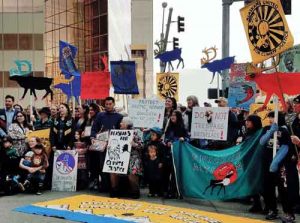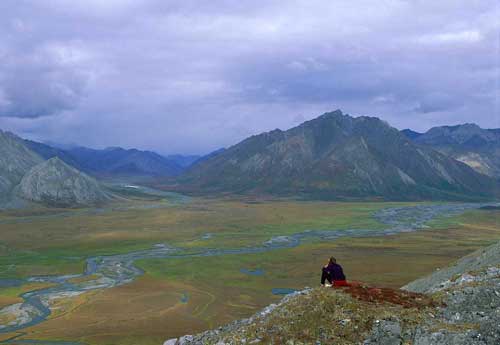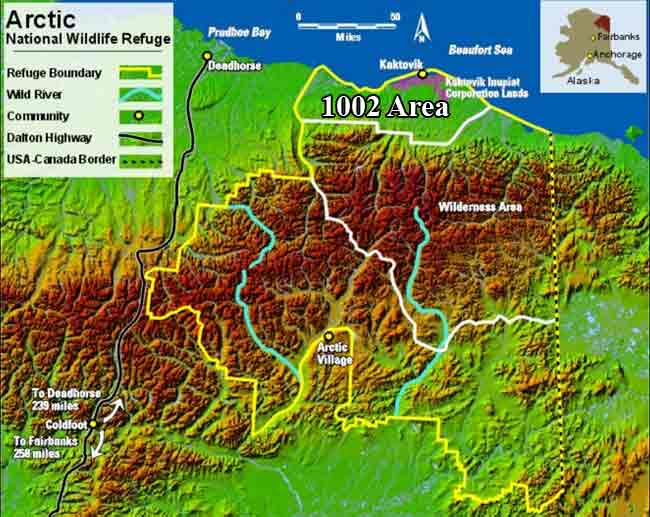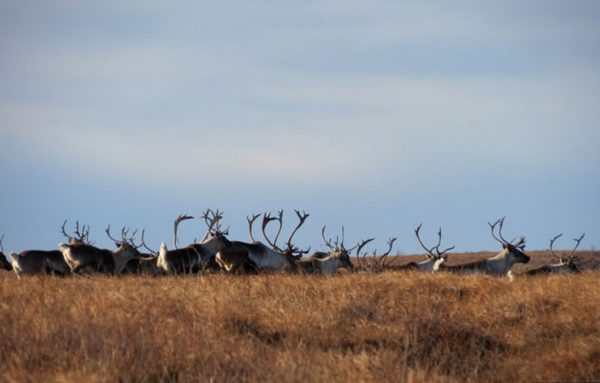
FAIRBANKS, AK—More than 350 Alaskans rallied in Arctic Village, Anchorage, and Fairbanks during public comments to add their voices to a growing movement demanding an end to plans for oil extraction in the Arctic National Wildlife Refuge. Defend the Sacred – Alaska, a statewide network of climate change and Indigenous rights entities, organized testimonial rallies coinciding with Interior Department hearings in Alaska hubs Fairbanks and Anchorage. Hundreds of Alaskans clamored to make public comments for limited speaking spaces at the hearing, but the Interior Department silenced just under one hundred of them, failing to allow adequate time for all Alaskans to provide comment.
In Tuesday’s Fairbanks hearing, more than 150 Alaskans gathered after signing in with BLM, where a series of speakers addressed a charged audience during the three hour wait for public testimony. Many attendees and speakers hail from communities such as Beaver, Old Crow (Yukon Territory), Utqiaġvik, Arctic Village, Venetie, and throughout the Caribou Clan lands which would be directly impacted by oil drilling in the Refuge. More than 50 attendees spoke out against drilling in the Refuge, but another 40 who had signed up to speak hours earlier were denied the opportunity due to time constraints placed on the hearing. Each attendee who had been silenced in this manner verbally requested that BLM hold another hearing before the scoping period concludes.
The following day, 145 Anchorage residents rallied in front of the Dena’ina Center just before the hearing began. With painted caribou cut-outs and signs that read “Defend The Sacred” and “Alaskans United for Climate Justice” they circled around a short series of speakers from across Alaska. Samuel Johns, Ahtna Athabascan and Anchorage local, shared that his mother is from Arctic Village saying, “It’s an honor to be here, it means alot, especially to my mom and my moms people”. Raymond Ipalook of Nuiqsut said, “I want to remind you – who are the true Alaskans here? My people, the Gwich’in people, were here. Imagine listening to your elders cry because of how much disruption has been caused in my village”.
While addressing BLM earlier this month in Arctic Village, Jerrald John, Arctic Village Council alerted BLM to the reality of the reliance on the Porcupine Caribou Herd, along with his communities’ sharing economy, stating “I could spend $30 buying a steak at the store to feed myself or I could spend $30 on shells and feed the entire community.”
Rhonda Pitka of Beaver, Vice Chair of the Consortium of Athabaskan Tribal Governments, skipped preparing her family’s fish camp to fly to Fairbanks for the hearing. The Porcupine Caribou Herd, she said, “is the last healthy caribou herd in the world” because it’s in an area free of development. Pitka requested that the scoping period for the project be extended to at least 120 days to allow participation by members of Alaska Native communities who are currently moving into their fishing season.
Cam Webb, a professor of biology at the University of Alaska Fairbanks, urged the BLM to add a no-action alternative to their Environmental Impact Assessment, pointing out the biological and cultural degradation that would accompany oil drilling: “Drilling in the 1002 area would fundamentally undermine the ecosystem and cultural values of the Refuge.”
Stephen Harvey of Fairbanks similarly requested that a no-action alternative be included in the BLM’s Environmental impact assessment. “Humans have impacted such a vast area of the Earth’s surface; we must leave alone undisturbed wilderness and ecosystems to protect against future and current consequences of climate change, loss of biodiversity, etc.,” he said.
Dana Tizya-Tramm, a tribal leader of the Vutnut Gwich’in, traveled from Old Crow, Yukon Territory to speak against drilling in the Refuge, a trip that required routing through Whitehorse, Vancouver and Seattle to get to Fairbanks. Tizya-Tramm called out the process as a violation of US international treaty obligations to the Canadian Gwich’in: “You have signed an international agreement with the Canadian government, which speaks directly to consultation with the Gwich’in, my people. There are thousands of us in Canada, thousands of us, who wait with baited breath, during the entire hearing process. … Whether or not you support this process, it is a complete representation of the complete degradation of your democracy from the forefathers, to the Constitution, to the documents that we’re all so proud of … This is about money, this is about oil and gas, because it is definitely not about honoring agreements.”
“I am here to stand with the Gwich’in people, and many others around the globe, in opposition to drilling in the Refuge,” said Fairbanks resident Rose O’Hara-Jolly. “Make no mistake: it is greed that drives this policy. The passing of P.L. 115-97 was done outside of public process after decades of input against development. 70 percent of people oppose development in the Refuge,” O’Hara Jolly said. P.L. 115-97 refers to the tax code rewrite onto which Sen. Murkowski piggybacked drilling provisions.
The Interior Department’s intent to sell oil leases in the Arctic Refuge follows Sen. Murkowski’s successful effort to inject drilling language into the US Tax Bill that was signed into law last December. Murkowski’s use of budget reconciliation procedures to strip the Arctic Refuge of longstanding environmental protections has been blasted by experts. In a break with procedures ordinarily mandated by the National Environmental Policy Act, the Interior Department is legally mandated to hold oil lease sales by 2020, regardless of the outcome of their environmental impact assessment. Nevertheless, an enormous range of organizations and individuals, including the Gwich’in Steering Committee and Defend the Sacred AK, have pledged fierce defense of the Arctic Refuge.
[content id=”35021″]






